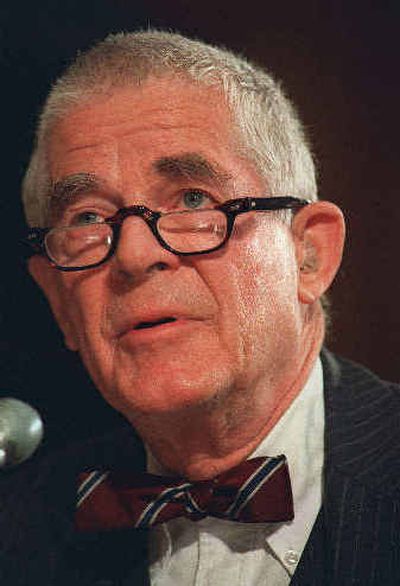Nixon special prosecutor Archibald Cox dies at 92

PORTLAND, Maine – Archibald Cox, the special prosecutor fired by President Nixon for refusing to curtail his Watergate investigation, died Saturday at his home, his daughter, Phyllis Cox, said. He was 92.
Cox, a longtime Harvard law professor, had also been an adviser to President John F. Kennedy and served him as U.S. solicitor general.
In May 1973, he was asked to head the special prosecution force investigating charges that Republican party operatives had broken into the Democratic campaign headquarters at the Watergate Hotel before the 1972 presidential election.
Nixon ordered Cox fired in October 1973 for his continued efforts to obtain tape recordings made at the White House, important evidence in the investigation of the Watergate break-in and cover-up.
The day before, Nixon refused to comply with a federal appeals court order to surrender the tapes, declined to appeal to the Supreme Court and ordered Cox to drop the case. But Cox vowed to continue, saying pulling back would violate his promise to the Senate and would be bowing to “exaggerated claims of executive privilege.”
The firing shook the nation and became known as “The Saturday Night Massacre.”
Attorney General Elliot Richardson and his deputy, William Ruckelshaus, both refused to carry out Nixon’s orders to fire Cox, resigning instead. Then-Solicitor General Robert Bork, who would 14 years later lose a Supreme Court bid after a strenuous debate over his legal theories, handled the job of firing Cox.
At his firing, Cox issued a one-sentence statement: “Whether ours shall be a government of laws and not of men is now for Congress and ultimately the American people.”
Reflecting on the scandal years later, he said it was a time when “the country showed its appreciation of the ancient rule that even the highest executive must be subject to the law. And I would hope that remains as an example to be followed if a similar challenge to the law ever occurs in the future.”
Nixon’s move gave rise to an effort to impeach him, and he eventually had to give up the tapes. In August 1974, Nixon became the only president ever to resign office.
“During Watergate, (Cox) was a special presence in the Supreme Court – a walking, breathing presumption that the government would win,” Harvard law professor Phillip Heymann once said.
Cox later said he was pleased that it was public outrage over the tapes issue that caught up with Nixon. He went on to serve as chairman of Common Cause, an organization that advocates improvement of the political system.